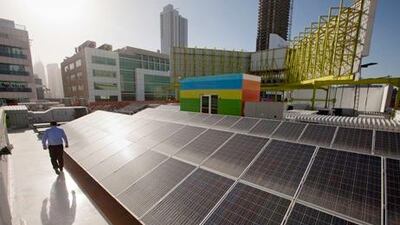It cost Dh73.6 million to turn a warehouse in Dubai's Al Quoz area into the city's first sustainability store, The Change Initiative.
The price tag for the concept store, a one-stop destination providing sustainable solutions for the community, business and government, was revealed this month.
The figure emerged weeks after the store was awarded the highest certification - platinum - under the Leadership in Energy and Environmental Design (Leed) international benchmark scheme for green buildings.
Solar power systems, efficient lights, advanced insulation and other green features were installed during the renovation, helping the building to gain 107 out of 110 points under the commercial interiors category of the scheme.
"It was more than a refurbishment, we almost reconstructed the whole building once again," said Gundeep Singh, the company's founder and chief executive.
"We started with the objective of being Leed platinum and we tried to tick every box," he said. "This was not easy, it was very tough."
Of all the technologies utilised in the building, lighting and automation were the biggest costs, said Mr Singh.
The facility relies on efficient but expensive light emitting diodes (LED) for all its illumination.
The building management system, motion sensors and automatic curtains that adjust according to the amount of sunlight and the temperature inside the building also came with a hefty price tag.
The building relies on solar power to provide 40 per cent of its energy and features sustainably-sourced paints, finishes and other materials.
Mr Singh said while the price tag may curb the enthusiasm of other private companies, he did not regret the decision. In terms of operational costs, the store can save 30 to 35 per cent on expenses. Running the shop costs Dh32,000 a month, about 80 per cent of which goes toward energy and water bills.
Investing in sustainability was also important to show The Change Initiative could "walk the talk".
"You can imagine that to create a brand like this, I think US$20 million (Dh73.6m) is not a lot. Now we have a global footprint, people know us all over the world because of what we have done and that matters a lot.
"The building is much healthier, it is iconic in many ways and last but not least, you are talking about a building that reduces its footprint by a significant amount for many years to come."
A little more than a year since the store launched last May, his efforts seem to have paid off with a turnover of Dh17m last year. This year's turnover is expected to be Dh70m, said Mr Singh, who described The Change Initiative as being "on the route to profitability". He expects it to be profitable within a year.
The building's restaurant and the business-to-business area, where lighting, energy, waste and water solutions for corporate and public clients are on offer, have been the most successful aspects of the business.
"The good news is that we have become the hub, so if you want to make a building sustainable, which is necessary today, all the solutions are available here," he said.
The Change Initiative still needs to attract more retail customers, said Mr Singh. "We expected a bit more of retail but our distribution of retail products is doing well," he said, explaining that home deliveries and an e-commerce scheme due to launch next month were steps being taken to boost retail business.
The concept store plans to expand to Singapore, Hong Kong and Doha, although Mr Singh was not able to offer a concrete timetable.
"We have had a lot of learning this year. We really want to do everything right," he said. "I want to make sure we understand our positioning, what people really want, and how do we get this entire proposition to people in a much more interesting way."

